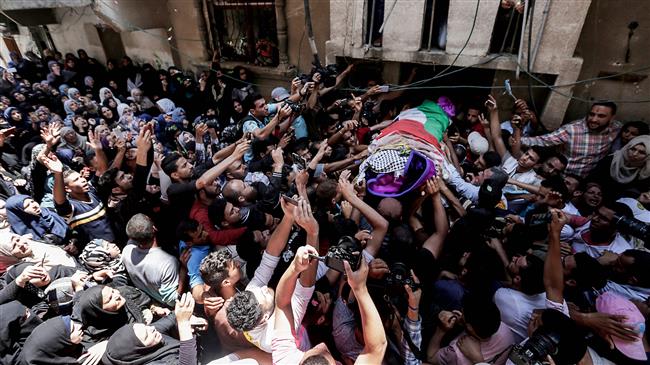
RNA - 21-year-old Razan Ashraf al-Najjar was attending to wounded Palestinian demonstrators east of Khan Yunis, located about 25 kilometers (15 miles) south of Gaza City, when she was shot by Israeli troopers on Friday.
Najjar was critically wounded as a result, and succumbed to her grave gunshot wounds shortly afterwards.
On Saturday, Ambulances and medical crews attended Najjar's funeral, with her father holding the white blood-stained medics’ jacket she wore when she was shot.
Following the funeral, mourners gathered for a protest, in which five people were injured by Israeli forces.
“I told her it was dangerous to approach [the fence] but she answered that she was not afraid to die and wanted to help the young man,” said a fellow medic.
According to the Palestinian Medical Relief Society (PMRC)said Najjar was shot “as she was attempting to provide first aid to an injured protester.”
"Shooting at medical personnel is a war crime under the Geneva conventions,” read a PMRC statement, which called for “an immediate international response to Israeli humanitarian law violations in Gaza.”
The UN’s envoy for the Middle East, Nickolay Mladenov, responded to the incident in a tweet that read “Medical workers are #NotATarget!”
During a last month interview with the New York Times, Najjar had talked about her role as a medic in the Gaza Strip.
“Being a medic is not only a job for a man. It’s for women, too,” she said.
“We have one goal. To save lives and evacuate people. And to send a message to the world: Without weapons, we can do anything,” she added.
“The strength that I showed the first day of the protests, I dare you to find it in anyone else,” she also said.
The Israeli military on Saturday said that an investigation has been opened into the incident which resulted in Najjar's death.
At least 120 Palestinians have been killed by Israeli forces since the “Great March of Return” began in Gaza Strip on March 30. Fourteen children are among the fallen Palestinians.
About 13,300 Palestinians also sustained injuries, of whom 300 are in a critical condition.
The occupied territories have witnessed new tensions ever since US President Donald Trump on December 6, 2017 announced Washington's recognition of Jerusalem al-Quds as Israel’s “capital” and said the US would move its embassy to the city.
According to Press TV, the dramatic decision triggered demonstrations in the occupied Palestinian territories and elsewhere in the world.
The status of Jerusalem al-Quds is the thorniest issue in the decades-long Israeli-Palestinian conflict.
The Palestinians see East Jerusalem as the capital of their future state.
847/940